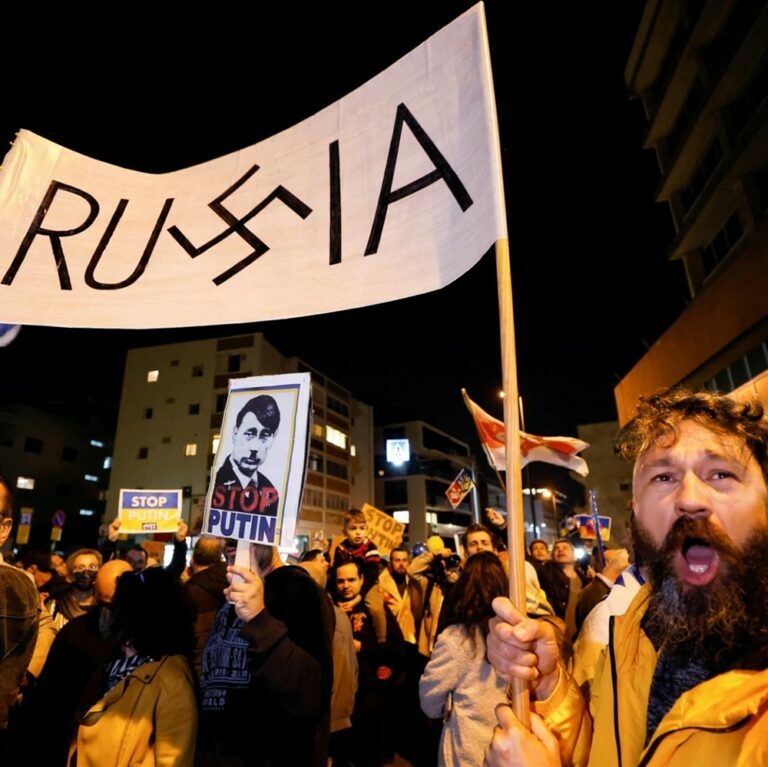
The international community strongly condemns the war waged by Russia in Ukraine and the occupiers’ crimes against humanity on Ukrainian land. Economic sanctions were imposed in response to the Russian Federation’s actions, and attitudes toward Russians worldwide have worsened significantly.
As a result, many citizens of the aggressor country are wary of Russophobia. They argue that Putin does not represent Russia as a whole, so why should everyone be punished for one man’s insanity? Similar ideas are expressed by some world political leaders, journalists, and cultural figures. However, the attack on Ukraine is a manifestation of an ideology and policy that the Russians have supported and funded for more than twenty years. Consequently, all Russian Federation citizens must bear responsibility for their government’s policy.
Gear of a military vehicle
People who believe that the invasion of Ukraine is Putin’s war ignore the fact that a full-scale invasion is a large project that requires significant training and involvement of many people: soldiers, military-industrial complex workers, logistics, propagandists, and taxpayers. All these people have been either implementing Putin’s plans or financing them since 2014 (when the Russian-Ukrainian war in eastern Ukraine and Russia’s occupation of Crimea began), so the war in Ukraine is also their war.

Torture, rape, mass shootings, and other types of atrocities against peaceful Ukrainians have already become the face of a full-scale war. Crimes against humanity on the territory of Ukraine are committed not personally by Putin but by about two hundred thousand Russian soldiers. They, not Putin, are shelling peaceful cities, controlling aircraft, and dropping bombs on residential buildings, schools, hospitals, and theaters where children are hiding. Even after receiving a criminal order, every soldier may or may not comply with it. Following orders from the superiors, if they lead to war crimes, is not a valid excuse, according to the Nuremberg Principles adopted after the Second World War.
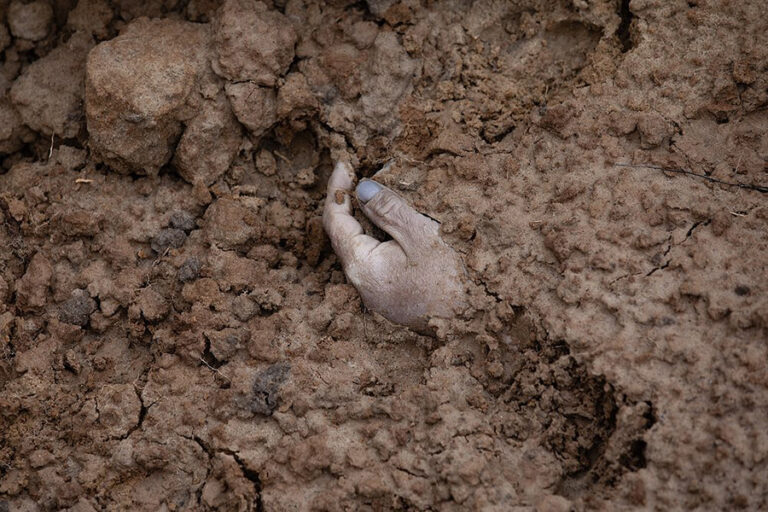
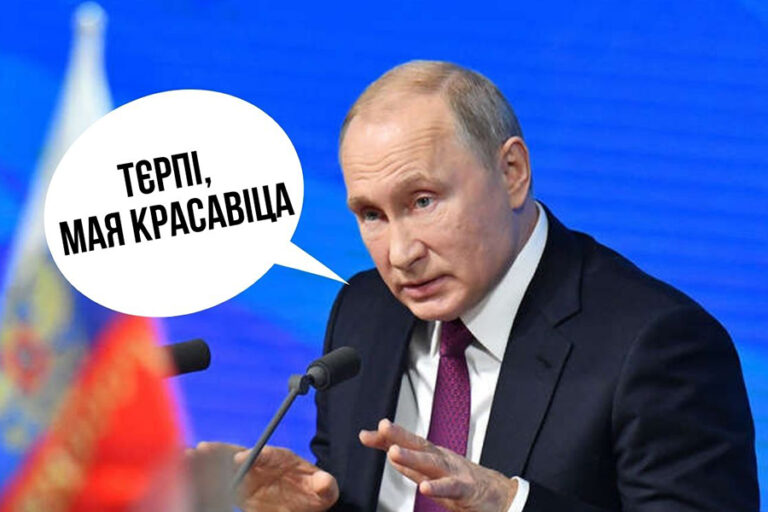
slideshow
It is not Putin who rapes women, shoots civilian cars with tanks, kidnaps city heads and even children to blackmail their parents, looting, and sends loot to relatives. It is also not he who organizes the forced export of Ukrainians to the occupied territories or Russia.
The terrible tortures and abuse of innocent people in Bucha, which the whole world saw in early April, were also committed not by the current president himself but by soldiers of the Russian Federation. Bucha is one of many liberated cities. It is not known how many more Ukrainians were tortured in Russian-occupied cities and villages where there are no communications and independent journalists. What is behind this cruelty: their own initiative and the ability to prove themselves or blind execution of orders — it does not matter because the final decision, in any case, is up to the soldiers who choose to kill and torture.

Such military actions are a direct consequence of education and social influence, which means that more than one generation of Russians has already professed false values. This is confirmed by numerous telephone conversations between the occupiers and their families, which are intercepted and posted online by the Security Service of Ukraine. In the recordings, parents and wives do not condemn soldiers who tell them about their atrocities but encourage them to rob and even rape.

In addition to the military, who take a direct part in the fighting on the territory of Ukraine, some people serve the military-industrial complex of the country. And these are hundreds of thousands of pieces of equipment used to kill Ukrainians every day. These are also phosphorous and thermobaric bombs, the use of which in the civilized world is prohibited or allowed only under specific conditions. Additional protocols restrict phosphorous ammunition to the Geneva Convention, which Russia has also signed. However, on March 24, 2022, the aggressor state used them against Ukrainians in the town of Rubizhne in the Slobozhanshchyna area. According to the Convention on Certain Conventional Weapons, which Russia has also signed and ratified, thermobaric weapons can only be used if they do not threaten civilians. The Russian Federation also violated this ban: thermobaric bombs were dropped in the first two weeks of the war.

As of 2020, more than 2.5 million Russians worked in the military-industrial complex of the Russian Federation. This is only production and not the entire logistics complex necessary for servicing the army. Only in the last 30 years has Russia launched a series of wars of conquest on the territories of independent countries, so the argument that this military equipment and ammunition were made exclusively for defense or export does not stand up to criticism. Also, during the eight years that Russia’s war against Ukraine has been going on, employees of the Russian military-industrial complex have been strengthening the aggressor’s military machine and, knowing where they use their production equipment, silently support the Kremlin’s lie that “there is no Russian military personnel in the Donbas.”

In the same year, the budget of the Russian military sector exceeded $60 billion. This budget is formed by 60% from taxes of citizens of the Russian Federation. Therefore, they primarily make it possible to continue the war on the territory of Ukraine.

They are not “afraid to judge”, but support
Seekers of “good Russians” can claim that Russian citizens have no real influence on the authorities in the country. Due to the laws adopted on March 4, 2022, on criminal liability for so-called fake information (and, in fact, any information that does not coincide with the official position of the authorities), they are simply afraid to speak out against the war. However, the Russian authorities have been pursuing an aggressive foreign policy for several years and allow themselves to impose their own interests on others by force. The population supports the Kremlin’s actions.

Many independent social surveys in Russia conducted in March 2022 show that between 70 and 83 percent of the Russian population supports the invasion of Ukraine. That is, the reason why people do not protest against the war is not that they are prisoners of the regime. CNN polls show that 50% support the use of military force against Ukraine to prevent it from joining NATO. Even if we assume that Russians are afraid to speak honestly in any polls, their actions still support the aggressive imperial policy of their authorities. A vivid example is the undisguised joy of Russians over the occupation of Crimea. According to many polls, from 86 to 95 percent supported such actions of the Kremlin, while no one forbade speaking out against it. And the fact that since 2014, about 48 million Russian citizens have come to rest in Crimea demonstrates that more than a third of the country’s population does not see any problems in the occupation of part of a sovereign state.
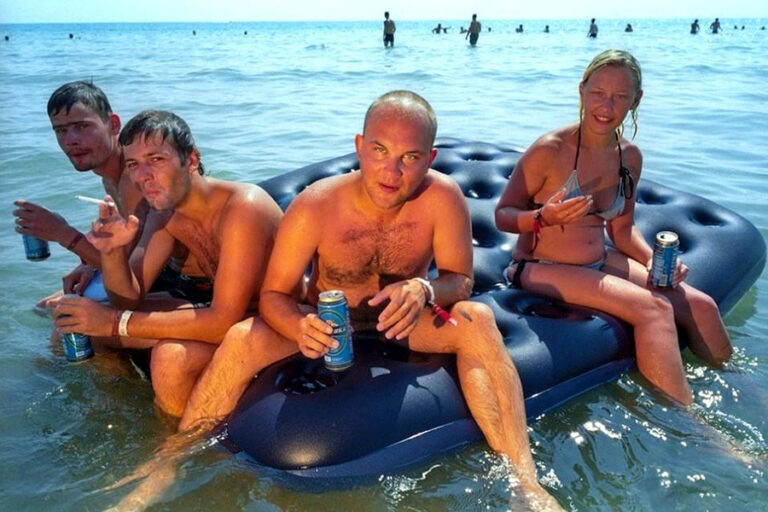
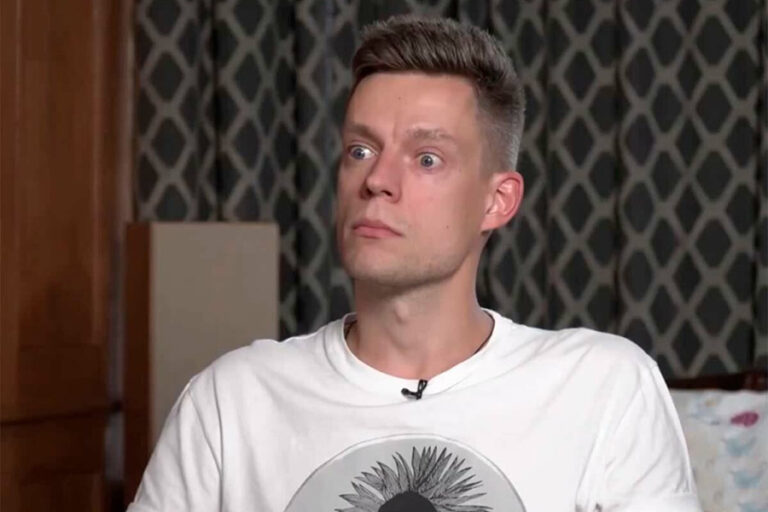
slideshow
Even the minority of Russians who talk about their apolitical nature or publish slogans “Say no to the war” on social networks do not necessarily recognize the criminality of the actions of the Russian army. Some believe that both countries are to blame. In contrast, others are generally convinced that Ukraine should surrender and give up its right to independently choose foreign policy direction to end this war as soon as possible.
As Aryeh Neier, an American human rights activist and co-founder of Human Rights Watch, notes, Putin did not always have so much power in the Russian Federation. According to him, the Russians had 22 years to notice and stop the slow emergence of tyranny in Russia, but they neglected to do so. The current president of Russia received possession of a relatively democratic state, whose inhabitants had real tools to influence the authorities. Even before the start of his first presidential term, Putin was head of the Russian government. It was directly involved in planning and implementing several “military operations”, particularly the bloody Second Chechen war. Putin’s brutality did not frighten the Russians. On the contrary, the American historian explains that they saw Putin as a “strong hand”, which is the kind of leader that most of the population wanted to have as the head of state.

During the years of his rule, Putin unleashed a number of conflicts in neighboring states and a full-scale war with Georgia, and economic and political pressure was and remained the essential tool of the Kremlin’s foreign policy. They do not disdain to use purely propaganda methods of influencing other states, applying the policy of soft power in the cultural and religious spheres through the media, and protecting the rights of the Russian national community. All this was supported by ordinary Russians because, as Oleksandr Nevzorov, a well-known Russian journalist and former State Duma deputy, explains, “for almost a century and a half, the state was obsessed with various imperial ideas, constant megalomania, and violence.”

Passive creators of an authoritarian regime
Russians are often pitied because they live in an authoritarian regime, where people’s rights are not considered, and the authorities control all media outlets. However, the Russians watched for 22 years how this regime was built on the blood of their compatriots and could not or did not want to resist terror.
During his rule, Putin intensively consolidated power in his hands and transformed branches of government into blind tools of his will. In 2002, the Duma adopted a bill on “countering extremist activities” — a kind of legal basis for reprisals against opponents of Putin’s regime. Then they created and developed “patriotic” youth organizations loyal to the authorities, which raided left-wing organizations, human rights defenders, and journalists, thus neutralizing the most proactive group of the country’s population. As a result of such terror, resistance subsided, and all dissenters were imprisoned or openly eliminated. The overwhelming majority of Russians turned a blind eye to these crimes. As a result, twenty years later, the population found itself in an authoritarian regime without freedom of speech and the right to determine the future of their country.

Some may notice that very consistent propaganda has been imposed on Russians over the years and that such indicators of support for the current president of the Russian Federation and a passive reaction to outright repression are the result of this propaganda. Indeed, Russia spends significant resources on propaganda. In 2020, it was created and distributed by about 500 thousand journalists — this figure was announced by the chairman of the Union of Journalists of Russia, Soloviov. The state media budget of that year also amounted to 1.3 billion in Russian taxes.
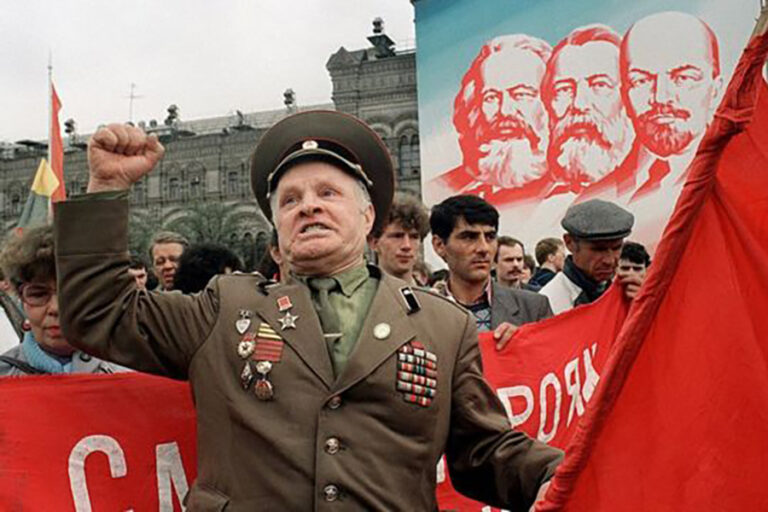
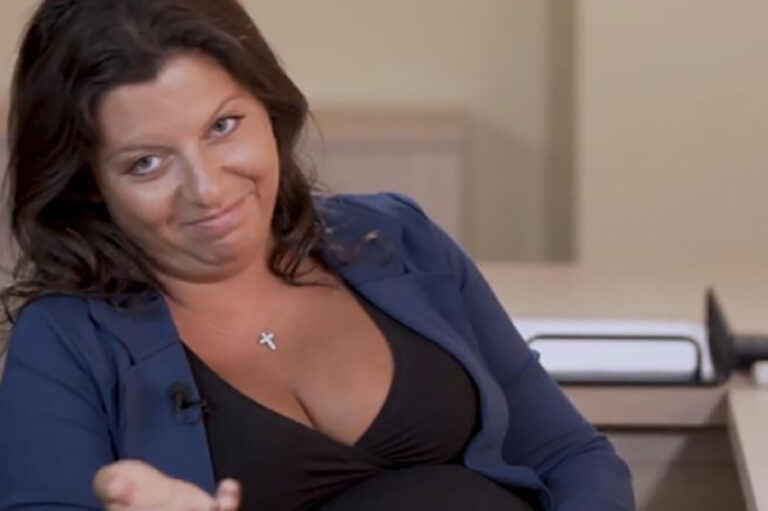
slideshow
According to Frederick Kagan, an expert on Russian and Soviet history, from his first day as President, Putin developed the myth that Russia was in such a difficult situation not because the economic system of the Soviet Union was unviable but because the West did everything to make Russia fall into disrepair. This narrative is well-supported by the lie that the collective West decided to continue to spoil Russia’s life by taking Ukraine away from Russian influence.
Fictional narratives spread by Russian propaganda that the Ukrainian Euromaidan protests were funded by Western countries, about neo-Nazis who the West also funds, and even absurd stories about allegedly created BioLabs in Ukraine with secret weapons to destroy Russians logically fit into this canvas of substituted concepts and distorted cause-and-effect relationships.
EUROMAIDAN, OR THE REVOLUTION OF DIGNITY
Protests that took place in Ukrainian cities in 2013-2014 against corruption, the arbitrariness of law enforcement agencies, and supporting the European vector of Ukraine's foreign policy.
Some may really feel sympathy for Russians who have been brainwashed for 22 years. But on the other hand, says Atlantic Council researcher Peter Dickinson, we live in the 21st century when almost everyone has access to the internet and therefore to alternative sources of information so that they can counteract propaganda. In addition, today, everyone in Europe and Russia knows how Nazi propaganda was created and effectively promoted and what the idea of the “superiority” of one nation over others can lead to. However, the Russians allowed themselves to be manipulated by turning a blind eye to the bloody conflicts that the Kremlin incited with their support and on their behalf.

Individual punishment but collective responsibility
Even now, many Russians accuse the whole world of allegedly groundless aggression against them, Russophobia, and the “abolition” of their culture, and complain that it’s been “difficult” for them too. The unwillingness of Russians to realize their involvement in the tragedy in Ukraine (“we didn’t want this”) attempts to convince the world that ordinary citizens of the Russian Federation “stand for peace” contribute to the spread in European countries of the narrative about “good Russians” who are not guilty of Putin’s crimes. In fact, it is also part of the Kremlin’s overall propaganda machine, which aims to evoke the sympathy of the European community for ordinary Russians and, as a result, ease economic pressure on Russia.
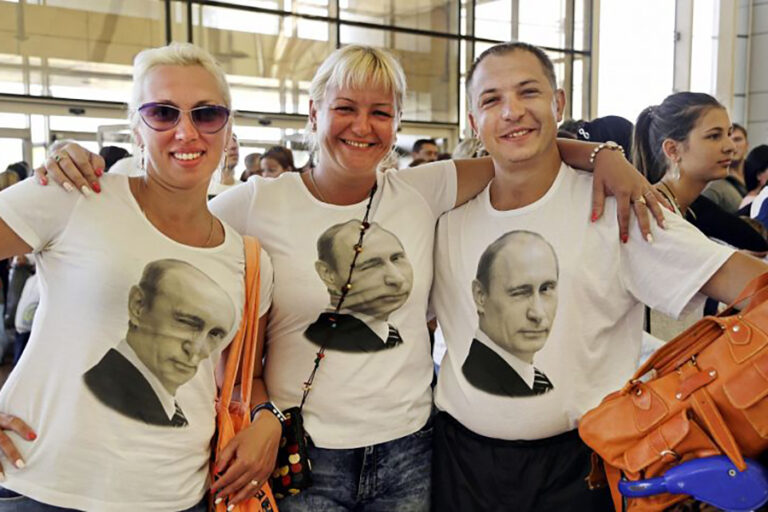
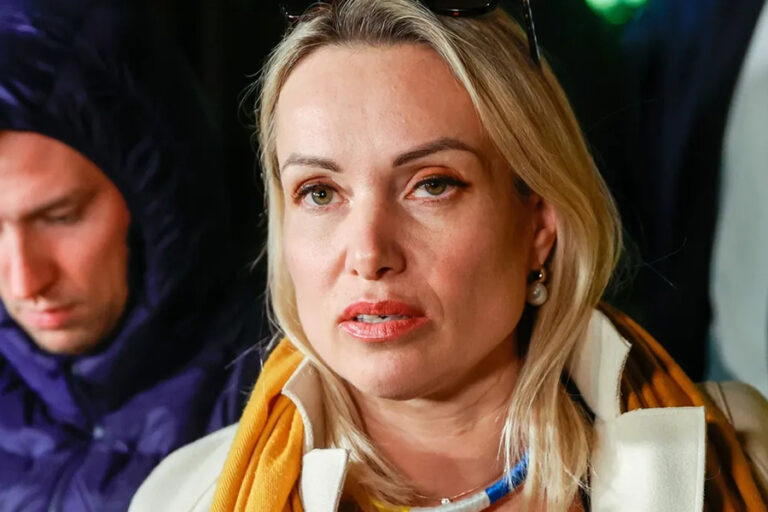
slideshow
An eloquent example of such a policy is the story of Maryna Ovsiannikova, a journalist of the Russian Pervyi channel. In early March 2022, the woman appeared on the Vremya news program with a poster against the war and later recorded an appeal where she spoke about how ashamed she was of spreading Russian propaganda. There are many questions about the truthfulness of her action: starting with how the woman managed to get into the studio of a state-controlled media outlet with a poster and ending with too easy punishment for violating the laws of the Russian Federation. Having received the sympathy of the whole world, Ovsiannikova not only got a job in the respected German media and the authority to cover events in Ukraine but also created the basis for promoting the myth of “good Russians”. Now the propagandist calls for lifting sanctions against Russia.
The fact that Russians are trying to massively flood the information space with their inconveniences due to sanctions (a furniture store has closed, a favorite clothing brand has left the market, or it is impossible to subscribe to a music service) shows that they do not have empathy for war-affected Ukrainians and demand more attention to their problems than to people who have lost loved ones, homes, health or been tortured. Economic sanctions are one of the few reasons that make Russians at least notice this war and worry about its course. Anyway, they do not dare to speak out actively on other “political” topics.

Calling the Russian invasion of Ukraine a “Putin’s war,” political leaders, journalists, cultural figures, and ordinary citizens of other countries underestimate the social consequences of more than twenty years of propaganda and repression. Even if the autocrat is removed from power, hatred, aggression, and imperial ambitions will remain in Russian society. In the context of the economic crisis that is already gaining momentum in the country and the political vacuum, this can lead to the search for new external enemies and new bloody conflicts. To prevent this, it is crucial to explain to the citizens of the Russian Federation that it was the actions or omissions of each of them that led to this situation. Accordingly, all Russians should be held accountable for what they have done on the territory of Ukraine to understand the price of inaction and learn to coexist peacefully with other independent states in the future.
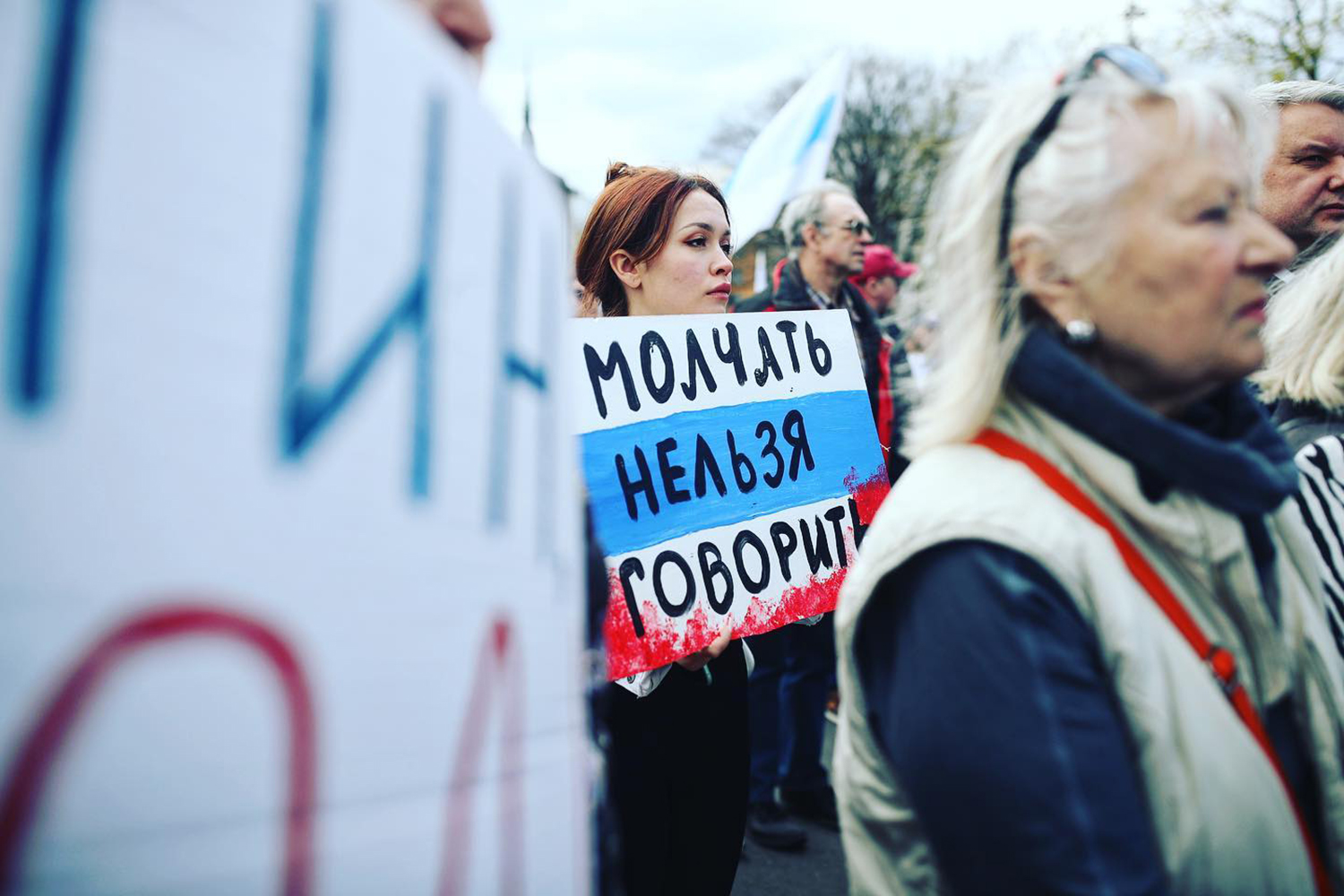
Photo: Yevhenii Feldman
The issue of collective responsibility of society for crimes of a part of this society began to be actively investigated after the Second World War. At the time, the idea that Hitler’s death or the dissolution of the National Socialist Party was absurd enough. This is evidenced in particular by the statement of then US President Franklin Roosevelt that “the German people should understand that the entire nation participated in lawlessness, in a conspiracy against modern civilization.” Carl Jung shared the same opinion. The psychologist said that, consciously or unconsciously, all Germans were involved in the horrors of war. The philosopher Karl Jaspers paid considerable attention to the problem of collective guilt. While lectures were eventually published in the “On The Question Of Guilt” book, the scientist noted that all Germans should be held accountable to varying degrees for the crimes of the Nazi regime because they did not prevent the establishment of a dictatorship.
The collective responsibility of Russians for the war in Ukraine does not mean that everyone is equally to blame. The penalty must be proportionate. Soldiers who committed war crimes on the territory of Ukraine, officers who gave criminal orders, employees of the state apparatus, and Russian propagandists are directly involved in the tragedy, so they should be held criminally liable. But everyone else — those who supported the actions of the Russian army and expressed their hatred for Ukrainians, and those who were silent, should feel the consequences of their actions or omissions, at least through economic sanctions and international restrictions. Such incentives from Western countries helped post-war Germany realize its involvement in the crimes of the Nazi regime, so we can expect that they will still help explain to Russians their responsibility for the actions of Putin’s regime. Russian society cannot be transformed unless this kind of understanding is shared. And without it, one should not hope for long-term peace in the world.

